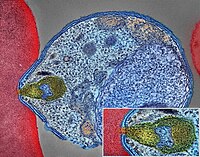
Photo from wikipedia
Significance Like most human pathogens, the malaria parasite Plasmodium falciparum experiences strong selection pressure from public health interventions such as drug treatment. While most commonly studied in the context of… Click to show full abstract
Significance Like most human pathogens, the malaria parasite Plasmodium falciparum experiences strong selection pressure from public health interventions such as drug treatment. While most commonly studied in the context of drug targets and related pathways, parasite adaptation to control measures likely extends to phenotypes beyond drug resistance. Here, we use modeling to explore how control measures can reduce levels of within-host competition between P. falciparum genotypes and favor higher rates of sexual investment. We validate these predictions with longitudinally sampled genomic data from French Guiana during a period of malaria decline and find that the most strongly selected genes are enriched for transcription factors involved in commitment to and development of the parasite’s sexual gametocyte form.
Journal Title: Proceedings of the National Academy of Sciences of the United States of America
Year Published: 2022
Link to full text (if available)
Share on Social Media: Sign Up to like & get
recommendations!